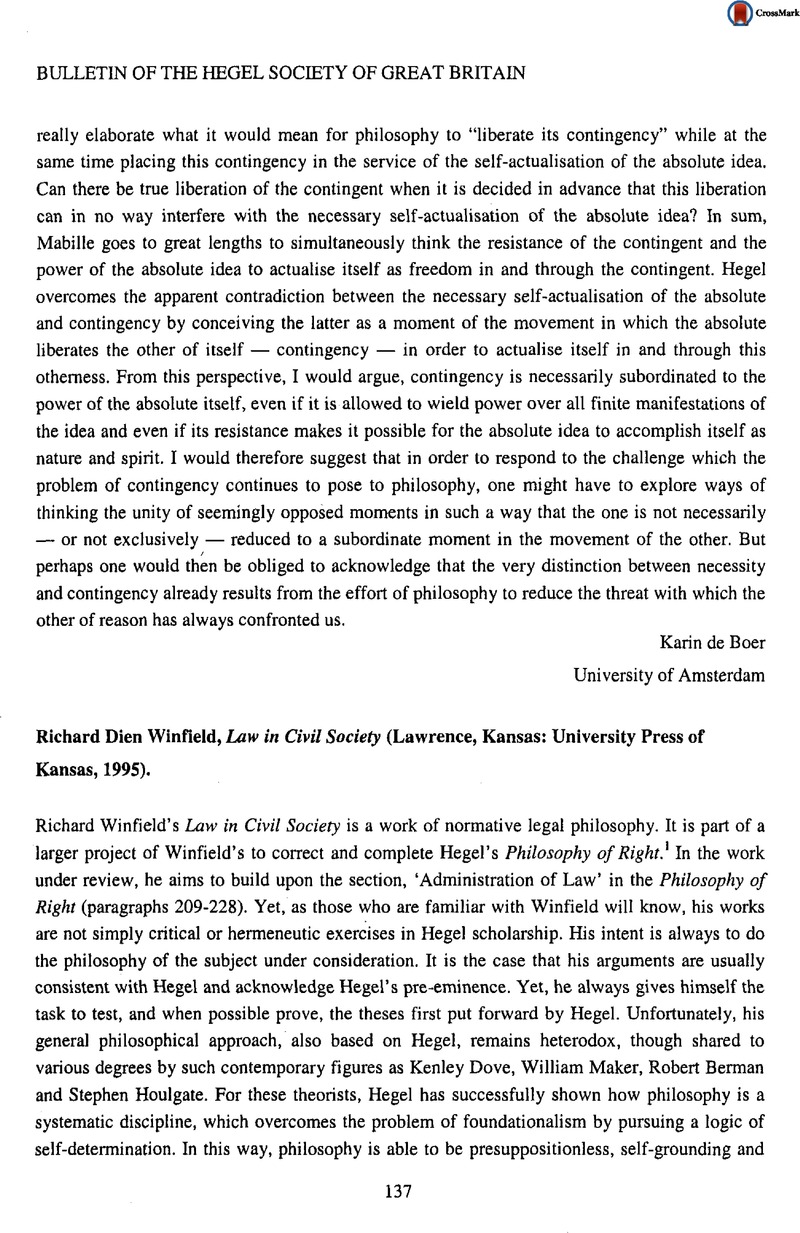No CrossRef data available.
Published online by Cambridge University Press: 23 June 2015

1 His Reason and Justice (Albany: SUNY Press, 1988)Google Scholar provides a schematic reworking of the whole of the Philosophy of Right. The Just Economy (New York: Routledge, 1988)Google Scholar and The Just Family (Albany: SUNY Press, 1998)Google Scholar cover sections of that work. In his collection of essays, Freedom and Modernity (Albany: SUNY, 1991)Google Scholar, there is a piece on morality: ‘Morality without Community’ (pp. 61-75). The state is the only domain of right in the Philosophy of Right which has yet to receive its own separate treatment by Winfield. Also in Freedom and Modernity, there are two pieces on capital and capitalist production: ‘The Logic of Marx's Capital’ (pp. 169-202) and ‘The Social Determination of the Labor Process from Hegel to Marx’ (pp. 202-226). These topics are not covered in either the Philosophy of Right or The Just Economy, though they are a necessary part of the complete account of the ethical society.
2 “The creation of civil society belongs to the modern world, which for the first time allows all determinations of the Idea to attain their rights,” Hegel, G.W.F., Elements of the Philosophy of Right, trans., Nisbet, H. B. (Cambridge: Cambridge University Press, 1991), p 220 CrossRefGoogle Scholar. “The simplest abstraction, then, which modern economics places at the head of its discussions, and which expresses an immeasurably ancient relation valid in all forms of society, nevertheless achieves practical truth as an abstraction only as a category of the most modern society,” Marx, Karl, Grundrisse, trans. Nicolaus, M. (New York: Vintage Books, 1973), p. 105 Google Scholar. “A product of modern European civilization, studying any problem of universal history, is bound to ask himself to what combination of circumstances the fact should be attributed that in Western civilization, and in Western civilization only, cultural phenomena have appeared which (as we like to think) lie in a line of development having universal significance and value,” Weber, Max, The Protestant Ethic and the Spirit of Capitalism, trans. Parsons, T. (New York: Charles Scribner's Sons, 1958), p. 13 Google Scholar.
3 This point is clearest with respect to that dimension of civil society that is economy. For the most part, philosophy does not even recognise the lacuna. It should be said that philosophies of liberty, private property, and welfare (e.g., basic income theories) are not philosophies of the economy. Formulations such as economic and social citizenship or the democratic economy (for the latter see Joshua Cohen and Rogers, Joel, ‘Secondary Associations and Democratic Governance’ in Wright, Erik Olin, ed., Associations and Democracy [London: Verso, 1995]Google Scholar) reflect this inability to determine a specifically economic ethic. The exceptions are, of course, Hegel, Marx and Winfield.
4 The numbers in parentheses in the text refer to pages in Law in Civil Society.